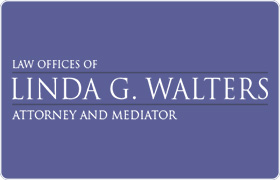 Chadds Ford Real Estate Lawyers, Pennsylvania
Chadds Ford Real Estate Lawyers, Pennsylvania
Sponsored Law Firm
-
 x
x

Click For More Info:
-
Law Offices of Linda G. Walters
114 Montgomery Ave Oreland, PA 19075» view mapDivorce & Family Where Every Client Matters
I offer my clients personal attention, customer service and caring and compassionate legal assistance.
800-883-9430
Warning! No lawyers found in this specified area.
Lawyers
1-0 of 0 matches



 Linda Walters Oreland, PA
Linda Walters Oreland, PA AboutLaw Offices of Linda G. Walters
AboutLaw Offices of Linda G. Walters Practice AreasExpertise
Practice AreasExpertise